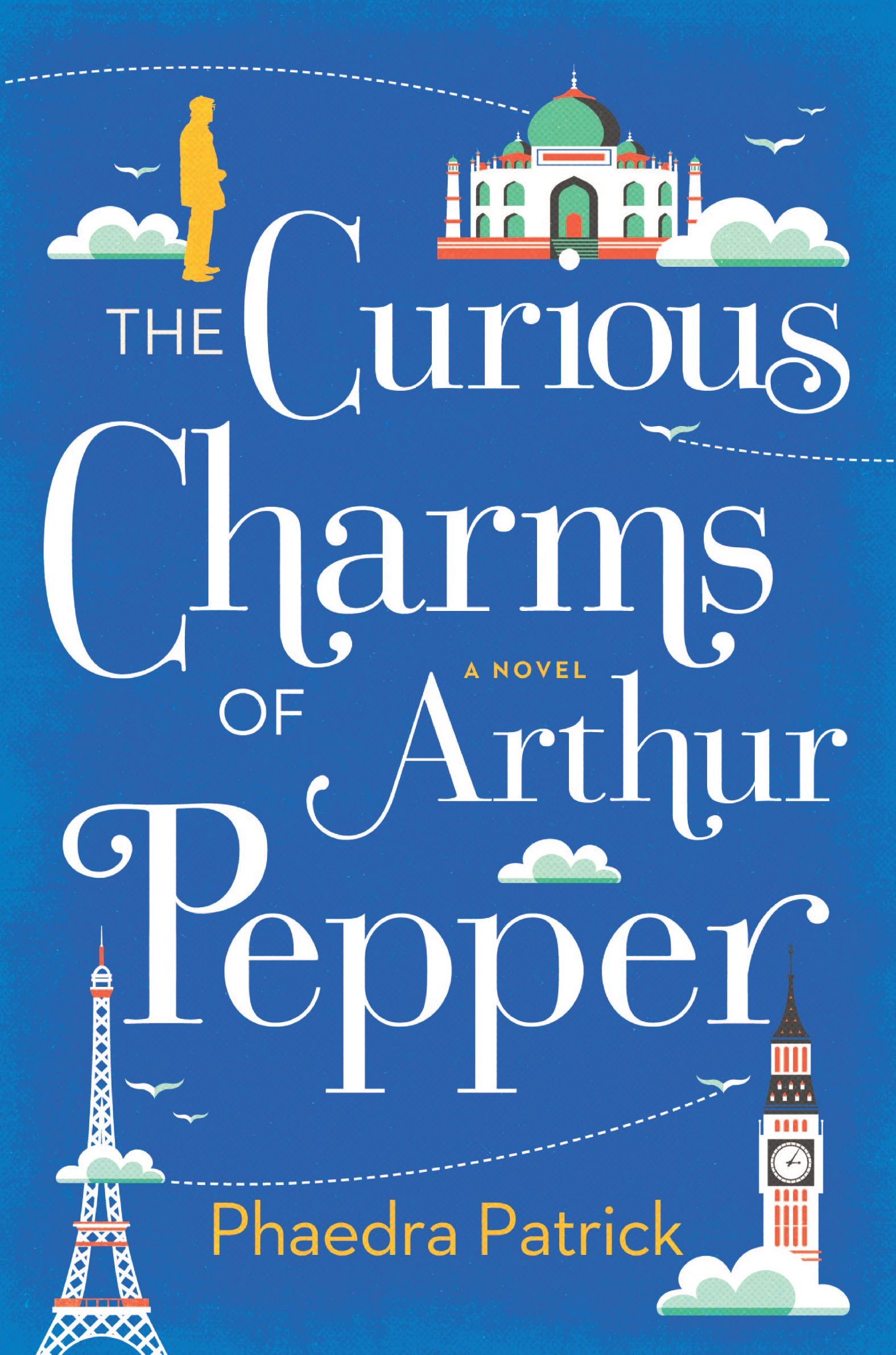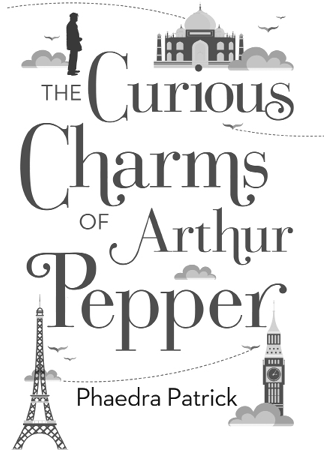The Curious Charms of Arthur Pepper
Read The Curious Charms of Arthur Pepper Online
Authors: Phaedra Patrick


In this poignant and curiously charming debut, a lovable widower embarks on a life-changing adventure
Sixty-nine-year-old Arthur Pepper lives a simple life. He gets out of bed at precisely 7:30 a.m., just as he did when his wife, Miriam, was alive. He dresses in the same gray slacks and mustard sweater vest, waters his fern, Frederica, and heads out to his garden.
But on the one-year anniversary of Miriam's death, something changes. Sorting through Miriam's possessions, Arthur finds an exquisite gold charm bracelet he's never seen before. What follows is a surprising and unforgettable odyssey that takes Arthur from London to Paris and as far as India in an epic quest to find out the truth about his wife's secret life before they metâa journey that leads him to find hope, healing and self-discovery in the most unexpected places.
Featuring an unforgettable cast of characters with big hearts and irresistible flaws,
The Curious Charms of Arthur Pepper
is a joyous celebration of life's infinite possibilities.


Praise for
The Curious Charms of Arthur Pepper
“Filled with colorful, complex characters and adventure,
The Curious Charms of Arthur Pepper
is a lovely story about grief and healing. I was moved by Arthur and his journey. You will be too.”
âMarisa de los Santos,
New York Times
bestselling author of
Love Walked In
“Once in a great while, a character like Arthur Pepper comes along and quietly steals your heart. Arthur might make you cryâbut he'll also make you laugh, think, and feel grateful that you came along on his fantastical journey.”
âSarah Pekkanen, bestselling author of
Things You Won't Say
“Eccentric, charming, and wise,
The Curious Charms of Arthur Pepper
is about finding courage, generosity, and compassion, even when all seems lostâ¦. This book will illuminate your heart.”
âNina George,
New York Times
bestselling author of
The Little Paris Bookshop
“A touching tale of rediscovering someone you love. Arthur Pepper is utterly charming and endearing.”
âLauren Willig,
New York Times
bestselling author of
The Other Daughter
“Tender, insightful, and surprisingâ¦.[Arthur Pepper] will instantly capture the hearts of readers who loved
The Unlikely Pilgrimage of Harold Fry, The Little Paris Bookshop
, and
The Red Notebook
.”
â
Library Journal
, starred review
Phaedra Patrick
studied art and marketing and has worked as a stained glass artist, film festival organizer and communications manager. She is a prize-winning short-story writer and now writes full-time. She lives in the UK with her husband and son.
The Curious Charms of Arthur Pepper
is her first novel.
For Oliver
Contents

The Surprise in the Wardrobe
EACH DAY ARTHUR
got out of bed at precisely 7:30 a.m. just as he did when his wife, Miriam, was alive. He showered and got dressed in the gray slacks, pale blue shirt and mustard sweater-vest that he had laid out the night before. He had a shave, then went downstairs.
At eight o'clock he made his breakfast, usually a slice of toast and margarine, and he sat at the pine farmhouse table that could seat six, but which now just seated one. At eight-thirty he would rinse his pots and wipe down the kitchen worktop using the flat of his hand and then two lemon-scented wipes. Then his day could begin.
On an alternative sunny morning in May, he might have felt glad that the sun was already out. He could spend time in the garden plucking up weeds and turning over soil. The sun would warm the back of his neck and kiss his scalp until it was pink and tingly. It would remind him that he was here and aliveâstill plodding on.
But today, the fifteenth day of the month, was different. It was the anniversary he had been dreading for weeks. The date on his Stunning Scarborough
calendar caught his eye whenever he passed it. He would stare at it for a moment, then try to find a small job to distract him. He would water his fern, Frederica, or open the kitchen window and shout, “Gerroff!” to deter next door's cats from using his rockery as a toilet.
It was one year to the day that his wife had died.
Passed away
was the term that everyone liked to use. It was as if saying the word
died
was swearing. Arthur hated the words
passed away
. They sounded gentle, like a canal boat chugging through rippling water, or a bubble floating in a cloudless sky. But her death hadn't been like that.
After over forty years of marriage it was just him in the house now, with its three bedrooms and the en suite shower room that grown-up daughter, Lucy, and son, Dan, recommended they had fitted with their pension money. The recently installed kitchen was made from real beech and had a cooker with controls like a NASA space center, and which Arthur never used in case the house lifted off like a rocket.
How he missed the laughter in the home. He longed to hear again the pounding of feet on the stairs, and even doors slamming. He wanted to find stray piles of washing on the landing and trip over muddy wellies in the hallway.
Wellibobs
the kids used to call them. The quietness of it being just him was more deafening than any family noise he used to grumble about.
Arthur had just cleaned his worktop and was heading for his front room when a loud noise pierced his skull. He instinctively pressed his back against the wall. His fingers spread out against magnolia woodchip. Sweat prickled his underarms. Through the daisy-patterned glass of his front door, he saw a large purple shape looming. He was a prisoner in his own hallway.
The doorbell rang again. It was amazing how loud she could make it sound. Like a fire bell. His shoulders shot up to protect his ears and his heart raced. Just a few more seconds and surely she'd get fed up and leave. But then the letterbox opened.
“Arthur Pepper. Open up. I know you're in there.”
It was the third time this week that his neighbor Bernadette had called around. For the past few months she had been trying to feed him up with her pork pies or homemade mince and onion. Sometimes he gave in and opened the door; most of the time he did not.
Last week he had found a sausage roll in his hallway, peeking out of its paper bag like a frightened animal. It had taken him ages to clear up the flakes of pastry from his welcome mat.
He had to hold his nerve. If he moved now she would know he was hiding. Then he'd have to think of an excuse; he was putting out the bins, or watering the geraniums in the garden. But he felt too weary to invent a story, especially today of all days.
“I know you're in there, Arthur. You don't have to do this on your own. You have friends who care about you.” The letterbox rattled. A small lilac leaflet with the title Bereavement Buddies
drifted to the floor. It had a badly drawn lily on the front.
Although he hadn't spoken to anyone for over a week, although all he had in the fridge was a small chunk of cheddar and an out-of-date bottle of milk, he still had his pride. He would not become one of Bernadette Patterson's lost causes.
“Arthur.”
He screwed his eyes shut and pretended he was a statue in the garden of a stately home. He and Miriam used to love visiting National Trust properties, but only during the week when there were no crowds. He wished the two of them were there now, their feet crunching on gravel paths, marveling at cabbage white butterflies fluttering among the roses, looking forward to a big slice of Victoria sponge in the tearoom.
A lump rose in his throat as he thought about his wife, but he held his pose. He wished he really could be made of stone so he couldn't hurt anymore.
Finally the letterbox snapped shut. The purple shape moved away. Arthur let his fingers relax first, then his elbows. He wriggled his shoulders to relieve the tension.
Not totally convinced that Bernadette wasn't lurking by the garden gate, he opened his front door an inch. Pressing his eye against the gap he peered around outside. In the garden opposite, Terry, who wore his hair in dreadlocks tied with a red bandanna and who was forever mowing his lawn, was heaving his mower out of his shed. The two redheaded kids from next door were running up and down the street wearing nothing on their feet. Pigeons had pebble-dashed the windscreen of his disused Micra. Arthur began to feel calmer. Everything was back to normal. Routine was good.
He read the leaflet, then placed it carefully with the others that Bernadette had posted for himâFriends Indeed, Thornapple Residents Association, Men in Caves and Diesel Gala Day at North Yorkshire Moors Railway
â
then forced himself to go and make a cup of tea.
Bernadette had compromised his morning, thrown him off balance. Flustered, he didn't allow his tea bag enough time in the pot. Sniffing the milk from the fridge, he winced at the smell and poured it down the sink. He would have to take his tea black. It tasted like iron filings. He gave a deep sigh.
Today he wasn't going to mop the kitchen floor or vacuum the stairs carpet so hard that the threadbare bits grew balder. He wasn't going to polish the bathroom taps and fold the towels into neat squares.
Reaching out, he touched the fat black telescope of bin liners that he'd placed on the kitchen table and reluctantly picked them up. They were heavy. Good for the job.
To make things easier he read through the cat charity leaflet one more time:
Cat Saviors
.
All items donated are sold to raise funds for badly treated cats and kittens.
He wasn't a cat lover himself, especially as they had decimated his rockery, but Miriam liked them even though they made her sneeze. She had saved the leaflet under the telephone and Arthur took this as a sign that this was the charity he should give her belongings to.
Purposefully delaying the task that lay ahead, he climbed the stairs slowly and paused on the first landing. By sorting out her wardrobe it felt as if he was saying goodbye to her all over again. He was clearing her out of his life.
With a tear in his eye, he looked out of the window onto the back garden. If he stood on tiptoe he could just see the tip of York Minster, its stone fingers seeming to prop up the sky. Thornapple village, in which he lived, was just on the outskirts of the city. Cherry blossoms had already started to fall from the trees, swirling like pink confetti. The garden was surrounded on three sides by a tall wooden fence that gave privacyâtoo tall for neighbors to pop their heads over for a chat. He and Miriam liked their own company. They did everything together and that was how they liked it, thank you very much.
There were four raised beds, which he had made out of railway sleepers and which housed rows of beetroots, carrots, onions and potatoes. This year he might even attempt pumpkins. Miriam used to make a grand chicken and vegetable stew with the produce, and homemade soups. But he wasn't a cook. The beautiful red onions he picked last summer had stayed on the kitchen worktop until their skins were as wrinkly as his own and he had thrown them in the recycling bin.
He finally ascended the remainder of the stairs and arrived panting outside the bathroom. He used to be able to speed from top to bottom, running after Lucy and Dan, without any problem. But now, everything was slowing down. His knees creaked and he was sure he was shriveling. His once-black hair was now dove white (though still so thick it was difficult to keep flat) and the rounded tip of his nose seemed to be growing redder by the day. It was difficult to remember when he stopped being young and became an old man.
He recalled his daughter Lucy's words when they last spoke, a few weeks ago. “You could do with a clear-out, Dad. You'll feel better when Mum's stuff is gone. You'll be able to move on.”
Dan occasionally phoned from Australia, where he now lived with his wife and two children. He was less tactful. “Just chuck it all out. Don't turn the house into a museum.”
Move on? Like to bloody where? He was sixty-nine, not a teenager who could go to university or on a gap year.
Move on.
He sighed as he shuffled into the bedroom.
Slowly he pulled open the mirrored doors on the wardrobe.
Brown, black and gray. He was confronted by a row of clothes the color of soil. Funny, he didn't remember Miriam dressing so dully. He had a sudden image of her in his head. She was young and swinging Dan around by an arm and legâan airplane. She was wearing a blue polka-dot sundress and white scarf. Her head was tipped back and she was laughing, her mouth inviting him to join in. But the picture vanished as quickly as it came. His last memories of her were the same color as the clothes in the wardrobe. Gray. She had aluminium-hued hair in the shape of a swimming cap. She had withered away like the onions.
She'd been ill for a few weeks. First it was a chest infection, an annual affliction which saw her laid up in bed for a fortnight on a dose of antibiotics. But this time the infection turned into pneumonia. The doctor prescribed more bed rest and his wife, never one to cause a fuss, had complied.
Arthur had discovered her in bed, staring, lifeless. At first he thought she was watching the birds in the trees, but when he shook her arm she didn't wake up.
Half her wardrobe was devoted to cardigans. They hung shapeless, their arms dangling as if they'd been worn by gorillas, then hung back up again. Then there were Miriam's skirts: navy, gray, beige, mid-calf-length. He could smell her perfume, something with roses and lily of the valley, and it made him want to nestle his nose into the nape of her neck,
just one more time please, God
. He often wished this was all a bad dream and that she was sitting downstairs doing the
Woman's Weekly
crossword, or writing a letter to one of the friends they had met on their holidays.
He allowed himself to sit on the bed and wallow in self-pity for a few minutes and then swiftly unrolled two bags and shook them open. He
had
to do this. There was a bag for charity and one for stuff to throw out. He took out armfuls of clothes and bundled them in the charity bag. Miriam's slippers, worn and with a hole in the toe, went in the rubbish bag. He worked quickly and silently, not stopping to let emotion get in the way. Halfway through the task and a pair of gray Hush Puppies lace-ups went in the charity bag followed by an almost identical pair of Clarks ones. He pulled out a large shoebox and lifted out a pair of sensible fur-lined brown suede boots.
Remembering one of Bernadette's stories about a pair of boots she'd bought from a flea market and found a lottery ticket (nonwinning) inside, he automatically slid his hand inside one boot (empty) and then the other. He was surprised when his fingertips hit something hard. Strange. Wriggling his fingers around the thing, he tugged it out.
He found himself holding a heart-shaped box. It was covered in textured scarlet leather and fastened with a tiny gold padlock. There was something about the color that made him feel on edge. It looked expensive, frivolous. A present from Lucy, perhaps? No, surely he would have remembered it. And he would never have bought something like this for his wife. She liked simple or useful things, like plain round silver stud earrings or pretty oven gloves. They had struggled with money all their married life, scrimping and squirreling funds away for a rainy day. When they had eventually splashed out on the kitchen and bathroom, she had only enjoyed them for a short while. No, she wouldn't have bought this box.
He examined the keyhole in the tiny padlock. Then he rummaged around in the bottom of the wardrobe, pushing the rest of Miriam's shoes around, mixing up the pairs. But he couldn't find the key. He picked up a pair of nail scissors and jiggled them around in the keyhole, but the lock remained defiantly closed. Curiosity pricked inside him. Not wanting to admit defeat, he went back downstairs. Nearly fifty years as a locksmith and he couldn't bloody get into a heart-shaped box. In the kitchen bottom drawer he took out the two-liter plastic ice cream carton that he used as a toolboxâhis box of tricks.